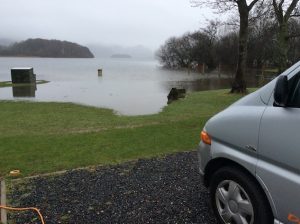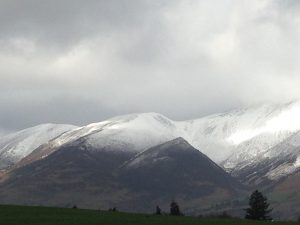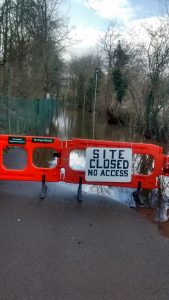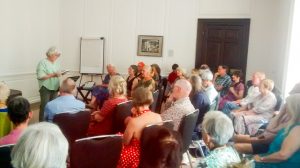A few years ago, I wrote a blog about the Words by the Water Festival of Words and Ideas. We have continued to visit this lovely festival most years, camping in our little van on the shores of Derwentwater and walking across the hill each day to the Theatre on the Lake, for an enriching series of talks, readings and lectures.
This year, following an unseasonably warm, dry February, the elements decided to greet us in Cumbria with rain, hail, snow and ice, which added a certain interest and spice to our camping.

The first night, as we slept, the lake crept up to meet us, so the next morning we were moved to a slightly higher pitch, where we were safe from inundation but could still enjoy the glorious view.

The following day, snow crept down the mountains to chill us a little, and the dramas of extreme weather continued through the week. After three nights on the campsite, we arrived back late at night to find our little van all alone. All the other camper vans and caravans had been evacuated during the evening because of the imminent risk of flooding, but as we had been watching the film of Oscar Wilde, with our mobile ‘phones turned off, we hadn’t received the message asking us to head for dry land. We drove out and found a quiet spot beside the road on higher ground, where we enjoyed a peaceful night’s sleep. The next day we booked into a b&b for the rest of the week, which was just as well as the campsite had still not re-opened by the time we left. By then, not only was the campsite underwater, but most of the surrounding fields and woodland.
but as we had been watching the film of Oscar Wilde, with our mobile ‘phones turned off, we hadn’t received the message asking us to head for dry land. We drove out and found a quiet spot beside the road on higher ground, where we enjoyed a peaceful night’s sleep. The next day we booked into a b&b for the rest of the week, which was just as well as the campsite had still not re-opened by the time we left. By then, not only was the campsite underwater, but most of the surrounding fields and woodland.
This year’s programme of events at the festival looked as promising as ever, and we had ‘phoned the theatre on the day booking opened, to make sure we could get tickets to all the ones we wanted to attend. Tickets are not cheap, so it is necessary to be a little circumspect when selecting. But between us we covered a fair percentage of the treats on offer.
Rather than going through the programme to report on each event, I’ll mention some of the highlights of the festival, and pull together a few threads from the week.
Two of the best events we attended were on the first weekend.
Mike Berners-Lee gave an informative and balanced talk about climate change based on his new book,  ‘There is no Planet B’. The well-researched information in his talk could not fail to shock, but he also found a way to offer at least some hope that all is not yet lost – as long as we all take the threat extremely seriously, and act now to save the planet.
‘There is no Planet B’. The well-researched information in his talk could not fail to shock, but he also found a way to offer at least some hope that all is not yet lost – as long as we all take the threat extremely seriously, and act now to save the planet.
 Peter Sanford appeared in the main theatre to give a talk entitled ‘Angelology’. Peter is a gifted lecturer and held us spellbound as he explored the history and mythology of belief in angels. He quoted the surprising statistic that one in ten Britons claims to have experienced the presence of an angel. It would appear that many of these people believe in ‘guardian angels’, rather than in the more general, and more interesting idea of angels being messengers from God.
Peter Sanford appeared in the main theatre to give a talk entitled ‘Angelology’. Peter is a gifted lecturer and held us spellbound as he explored the history and mythology of belief in angels. He quoted the surprising statistic that one in ten Britons claims to have experienced the presence of an angel. It would appear that many of these people believe in ‘guardian angels’, rather than in the more general, and more interesting idea of angels being messengers from God.
Among the other exceptionally good events were Diarmaid MacCulloch on Thomas Cromwell, Kenneth Baker on Sins and Sinners, Marcus du Sautoy on Artificial Intelligence and Melissa Benn on Education – all inspiring speakers. MacCulloch gently filled some of the gaping holes in my knowledge of history and Baker had fun with the seven deadly sins, amply illustrated by slides. Du Sautoy gave an informative and lucid presentation of where we are in the development of AI and although I heard some of the audience afterwards complaining that he had scared the life out of them, he was honest about the advantages as well as the dangers of AI. Melissa Benn was lucid, charming, ideological and practical as she proposed a better model of education through a National Education Service built on the same model as the NHS.
 Marcus du Sautoy Melissa Benn
Marcus du Sautoy Melissa Benn
As usual, there were some well-known celebrities in the programme, such as Roger McGough and Melvyn Bragg. As one would expect, both of these spoke or read well, though perhaps being extremely celebrated can make it a little more difficult to stun an audience in a new way. There were also some quirky events, such as Christopher Skaife, the Ravenmaster at the Tower of London, talking about the ravens of the Tower (very good), and Irving Finkel, the Assyriologist at the British Museum, giving a rather strange and histrionic introduction to his latest book.
We enjoyed a couple of evening events: first a talk about Oscar Wilde by Michèle Mendelssohn, followed by the film, ‘Wilde’, starring Stephen Fry; and later in the week, a highly entertaining hour with the comedian, Robin Ince.
I chaired the Poetry Breakfast, at which 30 poets enjoyed coffee, croissants and fruit juice and read poems, either their own or from well-known poets. Without prior knowledge of the chosen readings, there is a always a certain risk to chairing an event like this, so it was gratifying that as the last reader finished, the clock showed that we had landed fairly and squarely on our advertised end time.
There was a philosophy day, at which Raymond Tallis and Julian Baggini spoke; an interesting talk about Gypsy Britain by Damian Le Bas; an inspiring story of a walk round the SW coast path, by Raynor Winn; an exploration of labyrinths and mazes by Henry Eliot; and a fascinating talk about Katherine of Aragon and Juana of Castile, by Julia Fox.
At a festival planned many months in advance, there are always likely to be a few changes and cancellations, but we got away fairly lightly this time. I was going to get my husband to report on the events he went to without me, particularly the political ones, but I think I have included enough here to give a good taste of the festival. Unfortunately, we had to leave before the final day, so missed a few events that would have been of interest.
This was the first year in which Kay Dunbar and Steve Bristow were not with us for the whole festival. Between them, this ‘Mr and Mrs Ways with Words’ not only started all three festivals (Dartington and Southwold being the others), but have run them brilliantly ever since their inception. They are now taking a back seat, and have handed on the Directorship to Leah Varnell, who with the rest of the Dartington team, especially Jane Fitzgerald and Philip John, is well-capable of maintaining the high standard of festivals that we have come to expect.
Comments closed
 Most of you probably know that I am a huge fan of Ways with Words, the literature and ideas festival that’s held at Dartington Hall in Devon every July. It was started in 1991 by Kay Dunbar and Steve Bristow, who ran it every year until they took a back seat this year, handing it on to their fantastic staff, Leah, Jane and Phil, to keep up the good work
Most of you probably know that I am a huge fan of Ways with Words, the literature and ideas festival that’s held at Dartington Hall in Devon every July. It was started in 1991 by Kay Dunbar and Steve Bristow, who ran it every year until they took a back seat this year, handing it on to their fantastic staff, Leah, Jane and Phil, to keep up the good work


 Mark Oakley is Canon Chancellor at St Paul’s Cathedral, though he will be moving at the end of next month, to take up the post of Dean of St John’s College, Cambridge. He is also a poetry-lover, with a keen ear and discriminating mind. In his recent book, ‘The Splash of Words: Believing in Poetry’, he has selected and presented twenty-nine poems, from all ages and in all forms, in each case then going on to a wide-ranging discussion of the work, his response to it, and his personal and faith journey. It makes riveting reading, and because practically all the poems are ones I have loved for years, reading it was like meeting up with old friends and forming an even deeper acquaintance with them.
Mark Oakley is Canon Chancellor at St Paul’s Cathedral, though he will be moving at the end of next month, to take up the post of Dean of St John’s College, Cambridge. He is also a poetry-lover, with a keen ear and discriminating mind. In his recent book, ‘The Splash of Words: Believing in Poetry’, he has selected and presented twenty-nine poems, from all ages and in all forms, in each case then going on to a wide-ranging discussion of the work, his response to it, and his personal and faith journey. It makes riveting reading, and because practically all the poems are ones I have loved for years, reading it was like meeting up with old friends and forming an even deeper acquaintance with them.